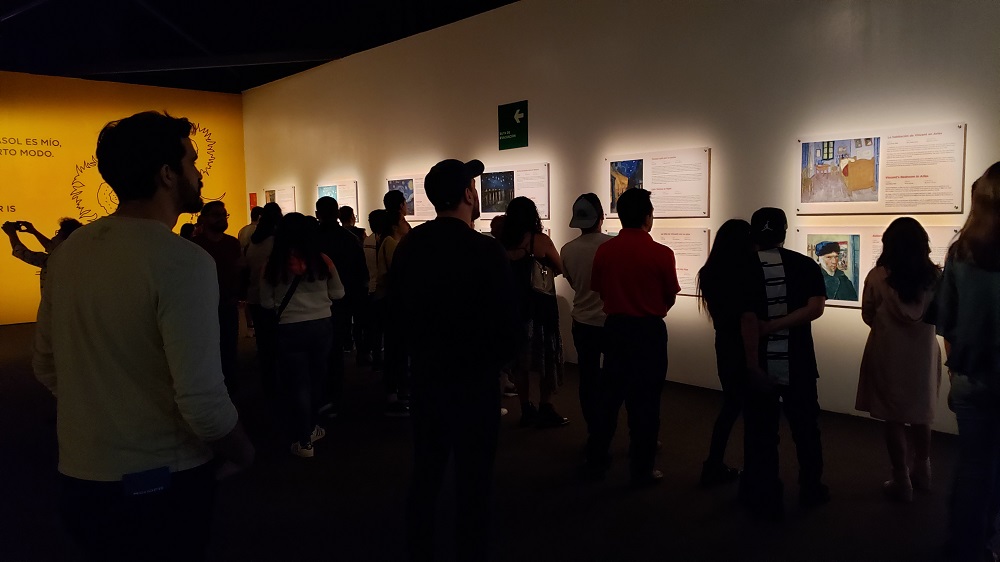Mexico’s health ministry said on Friday that confirmed coronavirus cases in the country now total 203, up by nearly a quarter from the previous day’s tally of 164.
On February 27, the first case of Covid-19 coronavirus in Mexico was confirmed; It was not until March 18 when the first victim of the disease was confirmed. Now, 22 days have passed since the first confirmed case of COVID-19 in Mexico and the numbers stand at two deaths and 203 confirmed cases.
Mexicans are still not taking COVID-19 seriously
While the popular exhibit, Van Gogh ALIVE in Mexico City was suspended beginning March 21, on March 20, PVDN witnessed large crowds of people attending the event with little regard to keeping a safe distance as onlookers viewed the exhibit.
In Mexico City, while notably less populated on the sidewalks, most people closely gather around street food vendors, inside small cafes, and huddling at the traffic lights ready to cross streets.
In stores, shoppers have little awareness of keeping the recommended one-meter distance between other people. And people are still canvassing the streets handing fliers out to passersbys for nearby businesses.
COVID-19 also affects young people
Despite the fact that coronavirus affects older adults more frequently, the young population constitutes a significant percentage of patients requiring hospitalization, warned the head of the World Health Organization (WHO), Tedros Adhanom Gebreyesus.
In a statement released this Friday, it reported that 12 percent of the cases of people found in hospital emergency units around the world are under the age of 50. So the reported that young people are not safe during the pandemic.
“This virus can put them to the hospital for several weeks or even kill them. But even if they don’t get sick, the decisions they make about where to go can make the difference between living and dying for someone else, ” said Adhanom Gebreyesus.
80% of cases will not be serious: UNAM
Alejandro Macías, a member of the University Commission for Emergency Care of Coronavirus at UNAM, said that 80% of positive cases of coronavirus will not develop serious health consequences, instead, most will remain asymptomatic, it will be only the 5% that will need attention in specialized units.
However, the expert clarified that we should not trust ourselves because the permanence of the coronavirus is one of the biggest health crises in generations and the problem should not be ignored.
“If we left the virus to its natural evolution, without taking extreme precautions, we could reach critical conditions and the collapse of the health system and social institutions,” warned the infectious disease specialist.
COVID-19 suspected patient causes eviction at INER
Shortly after noon yesterday, Carmen (who asked to change her name) and approximately 14 other people, were evicted from the emergency area of the National Institute of Respiratory Diseases (INER), because a 40-year-old man with pneumonia and suspected Covid- 19 entered the area.
The 33-year-old woman said that she was waiting to be tested for the new coronavirus because she has symptoms and was in contact with a suspected case, after about an hour, she was next to a man who was later known to have pneumonia and also suspected Covid-19, so institute staff had to sanitize the area.
“They took us out, they were going to take the sample because I was close to a person who still does not have their results, but are with symptoms, but then they told us that we had to leave and they isolated the man. They said he has a coronavirus and it worries me because I was close to him, I am afraid of getting something else,” she said.
INM reinforces measures for COVID-19
The National Institute of Migration (INM) in collaboration with health authorities, reinforced surveillance at different points of hospitalization to detect compatriots and foreigners who present symptoms related to the coronavirus.
“At airports, seaports, internment bridges and Institute buildings, including the INM Representation Offices in the states, the temperature of people is taken and recorded using laser equipment, as part of the monitoring tasks in the medical review by the local health authority,” reported in a statement.
Last goodbye in Italy for video call
Terminally ill patients at the San Carlo hospital in Italy say goodbye to their relatives using electronic tablets as a measure introduced for older adults, who were unable to say goodbye to their relatives after the coronavirus quarantine.
“The idea arose from Dr. Cortellaro, head of the hospital, who in an interview recounted the pain of people who entered the hospital alone and who left in total solitude, aware of what was about to happen and the lack of technological means to do video calls to relatives ”, wrote the councilman of Zone 6 in Milan, Lorenzo Musotto on Facebook.
Tablets were given to sick elderly people, isolated by coronavirus, through the doctor and the Democratic Party in Milan, so that they could say goodbye to their loved ones.
“This hurts me more than death itself and because there are certainly other nursing homes, hospitals and hospices where there is no longer the possibility of saying goodbye,” added Musotto.
Mexico’s health ministry said on Friday that confirmed coronavirus cases in the country now total 203, up by nearly a quarter from the . . .












